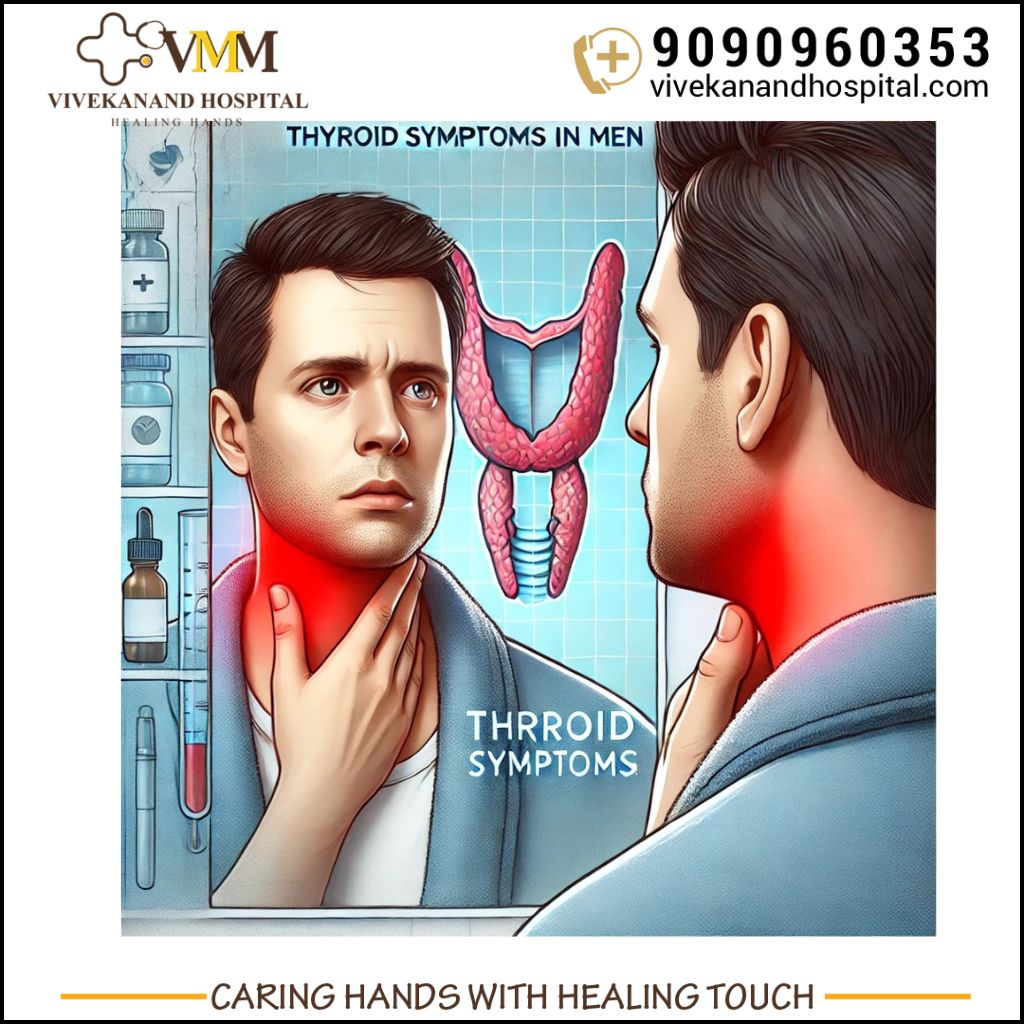Introduction:
Thyroid disorders, often associated with women, also significantly impact men’s health. The thyroid gland, located at the base of the neck, plays a crucial role in regulating metabolism, energy levels, and overall bodily functions. In men, thyroid dysfunction can lead to a variety of symptoms that, if left unaddressed, may result in serious health complications. At Vivekanand Hospital, Bhubaneswar, we emphasize the importance of recognizing these symptoms early to ensure timely and effective treatment.
Understanding Thyroid Disorders in Men:
Thyroid disorders occur when the thyroid gland produces either too much or too little hormone, leading to hyperthyroidism or hypothyroidism, respectively. While these conditions are more prevalent in women, men are not immune and often experience underdiagnosis due to a lack of awareness.
Common Symptoms of Thyroid Disorders in Men:
1. Unexplained Weight Changes:
Weight Gain: Men with hypothyroidism may notice unexplained weight gain despite maintaining their usual diet and exercise routines.
Weight Loss: Conversely, hyperthyroidism can lead to sudden weight loss without any significant changes in lifestyle.
2. Fatigue and Muscle Weakness:
Persistent Tiredness: Both hypo- and hyperthyroidism can cause constant fatigue, making daily tasks challenging.
Muscle Weakness: Particularly in the arms and thighs, muscle weakness can manifest, leading to difficulties in activities like climbing stairs or lifting objects.
Read Also: Understanding Thyroid Symptoms: A Guide by Vivekanand Hospital, Bhubaneswar
3. Cardiovascular Symptoms:
Rapid Heartbeat: Hyperthyroidism may present with a rapid or irregular heartbeat, sometimes exceeding 100 beats per minute.
Slowed Heart Rate: Hypothyroidism can result in a slower heart rate, contributing to feelings of fatigue and dizziness.
4. Mood and Cognitive Changes:
Depression and Anxiety: Thyroid imbalances can affect mood, leading to depression in hypothyroidism and anxiety or irritability in hyperthyroidism.
Memory Lapses: Men may experience difficulties with concentration and memory, often attributing these issues to aging rather than thyroid dysfunction.
5. Physical Changes:
Hair and Skin: Dry, coarse skin and thinning hair are common in hypothyroidism, while hyperthyroidism can cause fine, brittle hair and increased sweating.
Neck Swelling: An enlarged thyroid gland, known as a goiter, can cause visible swelling at the base of the neck.
Causes of Thyroid Disorders in Men:
Autoimmune Diseases: Conditions like Hashimoto’s thyroiditis and Graves’ disease can lead to hypothyroidism and hyperthyroidism, respectively.
Iodine Deficiency: Insufficient iodine intake can impair thyroid function, a concern particularly relevant in certain regions.
Medications and Treatments: Some medications and treatments, such as radiation therapy, can affect thyroid health.
Diagnosis and Treatment at Vivekanand Hospital:
Early detection is vital for effective management of thyroid disorders. At Vivekanand Hospital, Bhubaneswar, we offer comprehensive diagnostic services, including:
Blood Tests: To measure levels of thyroid hormones (T3 and T4) and thyroid-stimulating hormone (TSH).
Imaging Studies: Ultrasound and other imaging modalities to assess the structure and function of the thyroid gland.
Treatment plans are individualized, encompassing:
Medication: Hormone replacement therapy for hypothyroidism or antithyroid medications for hyperthyroidism.
Lifestyle Modifications: Nutritional guidance and stress management strategies to support overall health.
Surgical Intervention: In cases where medication is ineffective or contraindicated, surgical options may be considered.
Conclusion:
Awareness of thyroid symptoms in men is crucial for early diagnosis and treatment. If you are experiencing any of the mentioned symptoms, we encourage you to consult with our specialists at Vivekanand Hospital, Bhubaneswar. Our dedicated team is committed to providing personalized care to manage and treat thyroid disorders effectively.

